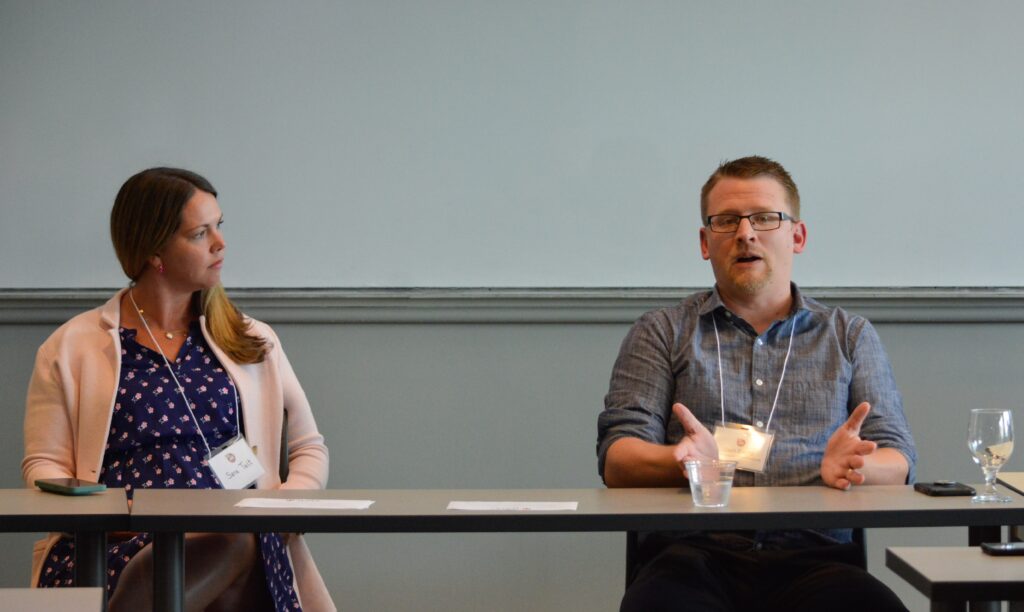By Matthew Brown
Sports Capital Journalism Program, IUPUI
Journalism has been the window to which people have been able to observe societal shifts over time. As legendary journalist John Hersey once said, “Journalism allows its readers to witness history.”
In the United States there is a societal redirection that has been in the works for years, the acceptance and legalization of sports betting.
For decades, sports betting inspired a stigma in the United States that until recently has kept it from being legalized and discouraged journalists from covering it. In the last several years, that has all changed.
“It is becoming enculturated, that is the reality,” Southeastern Conference Commissioner Greg Sankey said Thursday at the Associated Press Sports Editors Summer Conference keynote luncheon. “And as we see sports betting become more and more enculturated, we need to learn from what has happened before.”
In the workshop “You Wanna Bet,” the panel, moderated by Michael Kates, Managing Editor for Media Partnerships at gambling.com, held two sessions Thursday that exceeded the 75-minute periods.
“Everyone is engaged on the subject,” Kates said. “I think the fact that we went 15 minutes over and probably could have stayed for another 45 minutes speaks to everyone’s desire to learn about it and grow from it.”
The panel covered different topics from the process Indiana took on getting online sports betting regulated, to concerns with offshore betting and how offshore sportsbooks could be eliminated simply by the legalization of online sports betting in additional states.
Panelists also spent time combating some of the reasons why the normalization of sports betting could be harmful. They discussed the positives to regulated online betting, and with that, explained that whether sports betting becomes legitimized or not, people are still going to find ways do it. The key to working through everything is by making sure people are educated on the subject.
“Many got really vocal and concerned because they didn’t think that the regulatory system would protect their athletes,” former Indiana Gaming Commission Executive Director Sarah Tait said when speaking about the resistance Indiana faced working to regulate online sports betting. “What we did in Indiana was education and a lot of open dialogue. There were a lot of tough conversations where we were pointing out to folks, ‘Hey, this is already occurring in Nevada and offshore, but when you can shine a light on the activities you can have the protections.’”

Mike Szvetitz (pictured, top), 22-year veteran editor who is currently the General Manager and Director of Content at frontpagebets.com, said, “Lee Enterprises is a legacy business built on editorial content that is valued and respected. We really want to just educate people on here is what sports betting is, here is where it is legal, here is where it is not. And we also want to educate them on here is what it isn’t. Our job as journalists is to give you the information you want but in a responsible way.”
The rise in sports betting has created content that can be used by sports journalists, and the panelists took time explaining what that content can look like and how to use it.
“The bulk of what we do is look for ways to tell stories through the odds,” said Zach Ewing, the Director of Sports Betting and Gaming at bet.nola.com. “One of our most successful stories of the year so far has been when the Saints had expressed interest in quarterback Deshaun Watson. There was one day in March when the odds for the Saints to win the Super Bowl plummeted from 50:1 all the way to 20:1. Our lead writer, to his credit, saw this and said, ‘What the hell is this about?’ and immediately made the connection that maybe somebody knows something about how Deshaun Watson’s decision will turn out.
“The next day,” Ewing added, “the odds went right back up when he was traded to the Browns, but he wrote that story and that story did crazy business online. People were interested in that story, even if they weren’t necessarily betting, the odds told that story.”
There was so much more that could have been discussed, and needs to be discussed within this new and emerging shift in society.
“There is a lot to know on this topic,” said Barry Bedlan, Global Director of Text and New Markets Products at the Associated Press. “You could do the entire conference just on this, and I would almost argue that they should, because of the impact that this is having on sports coverage in general.”





